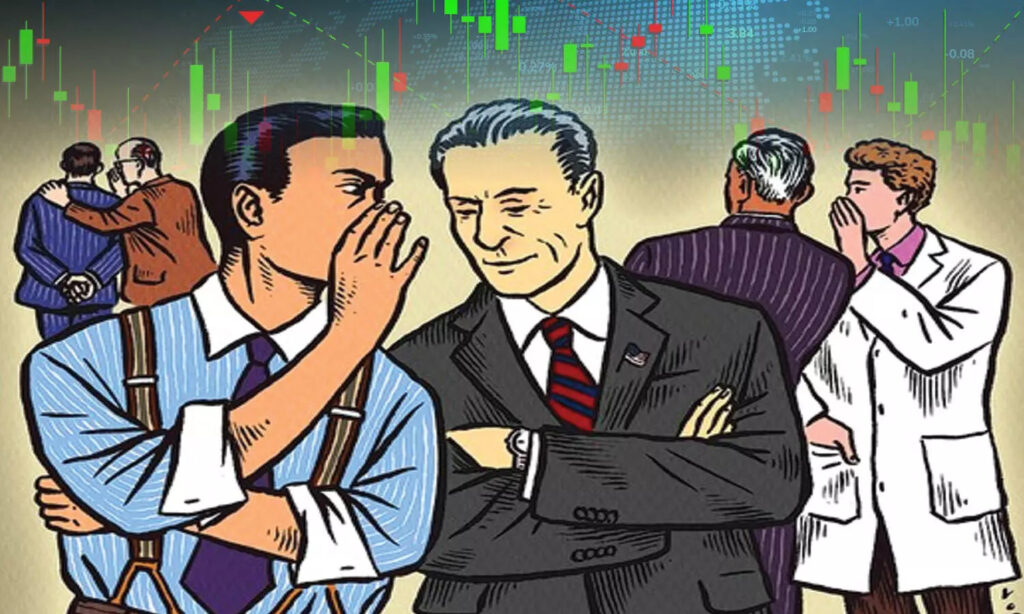Antitrust laws were established to protect trade and commerce from abusive practices. Violations can include price-fixing, price discrimination, restraints, and monopolization.
Miami Insider Trading Lawyer
Miami Insider Trading Attorney

Insider trading is a serious white-collar crime that has been increasing in South Florida. It happens when individuals use non-public, confidential information to buy or sell securities, gaining an unfair advantage in the stock market. If you are accused of insider trading in South Florida, you could face hefty fines, jail time, and other severe legal consequences. You should engage an experienced Miami insider trading attorney.
With so much at stake, it is crucial to seek expert legal counsel as soon as possible in order to determine the best way to proceed. A Miami white collar crime lawyer can help.
At The Kirlew Law Firm, we have over 15 years of experience defending individuals against white-collar crimes such as insider trading. We take pride in our work and dedication to representing clients passionately and aggressively. Schedule a free, no-obligation, and confidential consultation with us today—call (305) 521-0484.
What is Insider Trading?
Insider trading refers to the act of making securities trades (think stocks, options, and bonds) based on information that is not accessible to the public. Imagine a senior company executive who decides to buy a considerable number of shares after learning the news that is likely to cause the stock price to rise, but before this information is actually made public.
Insider trading is usually considered illegal because it undermines the principles of fair play and equal opportunity in the financial world. And unlike other types of investment fraud, the victims here are not just individual investors—the entire market is at risk of manipulation when insider trading occurs.
Seek Protection
Legal insider trading is also a reality that is often misunderstood. Not all insider trading is illegal. For instance, when corporate insiders, like officers, directors, or employees, buy or sell stock in their own companies and report these trades to the Securities and Exchange Commission, the transactions are legal.
These trades must be filed publicly through Form 4 within two business days. However, failure to disclose or misuse of non-public material information makes the trade illegal and prosecutable.
Who is an “Insider”?
According to SEC Rule 10b-5, the definition of an insider is surprisingly wide-ranging. You might think that only top executives, major shareholders, or those with access to confidential information because of their relationship with the company would be considered insiders, but the definition goes beyond that.
Even employees who regularly come across confidential information as part of their job are considered insiders. And if someone outside the company receives a “tip” from an insider about the material, non-public information, they too become an insider. Think of an elected official or a judge who becomes aware through their roles as government officials that a particular patent will become available or a certain company has an emerging technology before the public is aware.
This definition even extends to insiders’ family and close friends. For example, if the CEO of a company shares the news of an upcoming merger with their son, and the son then buys stock in the company before the merger is announced to the public, both the CEO and the son would be considered insiders.
Other Insiders
Contractors, consultants, and even journalists with early access to financial stories can also be considered insiders. Courts have repeatedly held that temporary insiders, those without permanent roles in a company but with legitimate access to confidential data, owe a duty of trust and confidence. This means that even third-party professionals who misuse material non-public information can be held liable.
Insider Trading Enforcement

The SEC (Securities and Exchange Commission) is the leading federal agency responsible for regulating the market and identifying insider trading. It is also the primary regulator that investigates and prosecutes cases of illegal securities transactions. The SEC has a special division—the Division of Enforcement (DOE)—responsible for taking legal action against those who violate securities laws through insider trading.
But the SEC is not the only one cracking down on insider trading! The Department of Justice (DOJ) and FINRA (Financial Industry Regulatory Authority) are two other key players in investigating and prosecuting insider trading. They can bring disciplinary actions or criminal charges against individuals and companies who engage in insider trading, ensuring that everyone in the industry follows the rules.
Whistleblower Programs
Additionally, whistleblower programs have become a crucial part of enforcement efforts. The SEC’s Office of the Whistleblower, established under the Dodd-Frank Act, allows individuals to report insider trading violations anonymously and potentially receive financial rewards.
In some cases, whistleblowers have received millions of dollars for information that led to successful prosecutions. This incentive system has made it easier for authorities to uncover complex insider trading networks that would otherwise remain hidden.
What are the Consequences of Insider Trading
The consequences of insider trading, like all federal offenses, are imprisonment, supervised release (probation), and fines. A person found guilty can be sentenced up to 20 years in prison for each count and the fine can be as high as $5 million.
Additionally, if you made any money through illegal insider trading, you may be required to forfeit it to the government This is called disgorgement and includes your ill-gotten gains and any interest accumulated.
Conspiracy charges may also be brought against individuals and companies involved in insider trading. Conspiracy charges could be brought against anyone in an agreement to commit insider trading, regardless of whether or not the crime was actually committed.
Further Consequences
Furthermore, insider trading convictions often lead to permanent damage to one’s professional reputation. Licensed professionals such as financial advisors, accountants, and attorneys may lose their licenses, effectively ending their careers. Corporate officers and directors may also face civil penalties, such as being barred from serving in any executive capacity at a publicly traded company.
Civil claims may also arise in tandem with criminal charges. Shareholders or regulatory agencies may file civil actions against alleged violators, seeking restitution for financial damages. Settlements in these claims often result in multimillion-dollar payouts, significantly compounding the financial impact.
Martha Stewart’s Insider Trading Scandal

Martha Stewart is a prolific American television personality. But she is also (in)famous for being at the center of one of the most high-profile insider trading scandals in recent history.
It all went down in December 2001. Martha sold nearly 4,000 shares in the biotech company ImClone Systems. The next day, the U.S. Food and Drug Administration (FDA) announced that it denied ImClone’s application for a new cancer drug. The announcement made ImClone’s stock price tumble by about 18% on the first day of trading.
The government charged Martha and her former stockbroker with multiple counts of securities fraud—including insider trading—in June 2003. Prosecutors claimed that Martha and her stockbroker had sold the ImClone shares based on advance notice of the FDA’s decision, whereas Martha and her stockbroker contended that they had already agreed to sell the stock if it dropped below a certain price. Martha was found guilty by a jury in May 2004.
Martha’s Consequences
As a result of her actions, Martha served five months in prison, five months of home confinement, and two years of probation. She also had to pay a $30,000 fine for crimes related to insider trading. It is a cautionary tale that shows how insider trading can have serious consequences, no matter how famous or successful you are.
Stewart’s case also shifted public perceptions about the seriousness of white-collar crime. It marked a period when federal regulators began taking a more aggressive stance toward celebrities and high-profile individuals suspected of financial wrongdoing. Her prosecution served as a deterrent, signaling that not even billionaires are above the law.
Real-World Examples of Insider Trading
Several other notable insider trading cases illustrate the complexity and risks of these crimes. In 2009, hedge fund manager Raj Rajaratnam was convicted of insider trading in a massive $60 million scheme. Federal wiretaps played a major role in his conviction, marking one of the first times such surveillance was used in a white-collar case. Rajaratnam was sentenced to 11 years in prison and fined over $150 million.
In another high-profile case, former Goldman Sachs board member Rajat Gupta was convicted of leaking confidential information to Rajaratnam. Despite his respected career and philanthropic endeavors, Gupta was sentenced to two years in prison.
These cases demonstrate that even individuals with stellar reputations and long careers in finance can fall from grace quickly. Although these cases highlight bigger issues of insider trading schemes, even smaller ones dealing with smaller amounts of money are often complex and require the assistance of an experienced and skilled insider trading attorney, especially one familiar with the local court system.
FAQs
Q: Can You File a Claim Against Someone for Insider Trading?
A: Yes, you can file a claim against someone for insider trading, but typically through a civil claim rather than criminal charges. Insider trading violates securities laws by using confidential information to gain an unfair advantage in trading stocks. Victims, such as investors who suffered losses, may file civil claims to recover damages. Additionally, regulatory agencies like the SEC can pursue enforcement actions.
Q: How Hard Is It to Prove Insider Trading?
A: Proving insider trading is quite challenging because it requires showing that someone traded securities based on material, non-public information. Prosecutors must demonstrate that the trader had access to confidential information and used it knowingly to gain an unfair advantage.
Evidence often involves emails, phone records, witness testimonies, or suspicious trading patterns. Since intent and access to insider information are key, cases can be complex and demand thorough investigations to connect the dots clearly enough for legal action.
Q: What Are the Four Elements of Insider Trading?
A: Insider trading involves four key elements. First, there must be material non-public information, significant details that have not been made available to the public. Second, the person trading must be an insider or someone who received this information from an insider, known as a tippee. Third, the trade must be made using this confidential information.
Lastly, the insider must have a duty to keep the information private and breach that duty by sharing it with others.
Q: What Is the Burden of Proof for Insider Trading?
A: The burden of proof for insider trading lies with the prosecution, which must demonstrate that the defendant knowingly traded securities based on material, non-public information. This requires proving the insider had access to confidential information, used it intentionally for personal gain, and that the information was significant enough to influence an investor’s decision.
The standard is “beyond a reasonable doubt,” meaning the evidence must be strong enough to leave no reasonable doubt about the defendant’s guilt.
Q: What Kind of Lawyer Do You Need for Insider Trading Cases?
A: For insider trading cases, you need a criminal defense lawyer who has experience in white-collar crimes. These attorneys understand the complex regulations enforced by the SEC and federal courts. They may navigate investigations, defend against charges, and negotiate settlements or plea deals.
Choosing a lawyer with skills in financial crimes and insider trading is crucial to protecting your rights and achieving the most optimal outcome possible. You may also want to choose someone with experience in your local court system.
Act Quickly to Defend Your Rights—Contact the Kirlew Law Firm NOW!
The stakes are high if you are facing insider trading charges. You could face serious fines and even prison time without a solid defense. That’s why it is crucial to have a seasoned Miami white-collar lawyer like Brian Kirlew, Esq. on your side. Our legal strategy is always customized to the client’s unique situation. We begin every case with a comprehensive analysis of the evidence, including trading records, communications, and internal reports.
We consult with professional witnesses, financial analysts, and forensic accountants to identify weaknesses in the prosecution’s case. Our attorneys also stay ahead of developing laws and legal interpretations, ensuring we apply the most up-to-date defense strategies.
Brian and the team of legal professionals at the Kirlew Law Firm in Miami are committed to providing each client with the individualized attention they deserve. With a proven record of success, you can trust that Brian and his team will fiercely fight to protect your rights and challenge any unjust accusations against you. Take control of your defense by calling the Kirlew Law Firm at (305) 521-0484 or reaching out online now.
Contact a Miami White Collar Criminal Attorney today!
If you are being investigated for a White Collar crime at the state or federal level (or both), the sooner you get a qualified attorney on your side to protect your rights, the better. Brian Kirlew, Esq. is experienced and skilled at handling these complex and sensitive matters, and is here to represent you in court. Our criminal defense attorneys in Miami are proud to offer you a free phone consultation to ensure that we can best serve you. Contact us immediately to get started.

